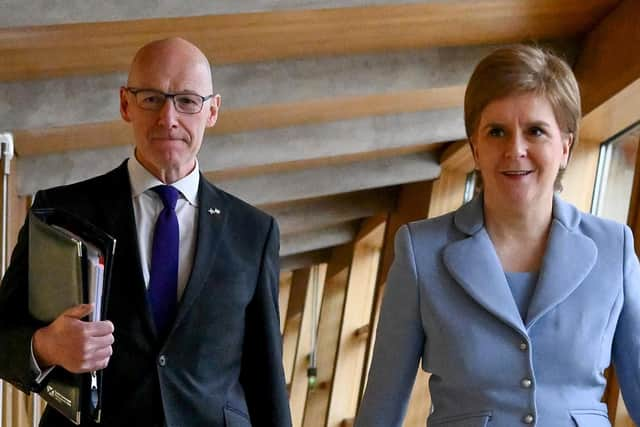GERS figures: Independent Scotland would face tough choices despite John Swinney's Brexiteer-style spin – John McLaren
While it’s far from perfect, GERS is one of the few informative guides that helps steer us through the implications of moving from a pre- to a post-independence state.
The key finding is, as it has been for a number of years, that Scotland has a large fiscal deficit (ie, the level of government expenditure is well above the level of government revenues) in both absolute and relative terms.
Advertisement
Hide AdAdvertisement
Hide AdBoth present a problem. In absolute terms, having a deficit is not unusual but, in these post-pandemic times, the scale, as for many countries, is uncomfortably high.
But it’s the higher deficit, relative to the UK, that’s of more political interest.
In financial year 2019-20, the last year where figures are not distorted by pandemic effects, Scotland’s deficit was 8.8 per cent of its GDP (including offshore revenues), while for the UK the figure was 2.4 per cent.
A relatively larger deficit shouldn’t come as a surprise given the geographical scale and distribution of Scotland, which demands higher-than-population-average spending. At present, these extra costs are not a Scottish concern as they are met from UK-wide revenues and borrowing. After independence, they would become a Scottish issue.
To bring the Scottish deficit, as a share of GDP, down to the same scale as the UK would require an adjustment of around £11 billion. That’s a big figure, not far off the size of the pre-pandemic health budget.


Doing so could be achieved through a mixture of cutting back some spending, with obvious areas being defence and other overseas commitments, and increasing taxes.
But GERS still leaves a number of variables to consider. For example, what financial deal could be done over keeping Trident and giving up any claim to overseas territories like the Falklands and British Territories in the Indian Ocean; who bears the cost of decommissioning nuclear and North Sea installations; and is inherited debt simply calculated according to population size?
But these are unlikely to change the basic calculation, which is that some narrowing of the fiscal deficit will be needed in order to reach a stable and sustainable position.
Advertisement
Hide AdAdvertisement
Hide AdThen there is oil. In 2008-09, oil and gas revenues were enough to put Scotland in a position of relative surplus, compared to the UK. Then prices and output fell away such that, in 2015-16, revenues were actually negative (it’s technical) and so its always highly erratic role in the equation became a footnote.
But no more, in financial year 2021-22 it was £3.5 billion, the highest level seen since 2013-14 and that figure will go much higher this year, with oil back over $100 a barrel of late. What’s more, some experts forecast prices to stay at such a level for years to come.
It’s difficult to be precise on future offshore revenues, as they depend on government tax policies and companies investment strategies, but it could be that, at such prices, Scotland’s relative fiscal deficit excess disappears, at least in the short to medium term.
The awkward part then becomes how to square this approach with a net-zero carbon emissions future. Tricky, but Norway appears to be doing it. There is no suggestion that they will close down, or slowly mothball, operations. In fact, they are continuing to explore new sites. But that hasn’t stopped them topping KPMG’s Net Zero Readiness Index – the UK was in second place, in case anyone thought it was rubbish.
It does so by being very pro net zero domestically while exporting almost all of its oil and gas. Such a dual policy approach is not inconceivable for an independent Scotland, although some political partnerships may have to be renegotiated.
The reality is that, as a high oil price cannot be relied upon, some of the oil revenues would need to be stored up, Norway style, in a Wealth (or Net Zero) Fund with only the remainder used to narrow the funding gap. This is probably a good thing as facing up to some difficult decisions at the point of independence, should it come, would act as a welcome discipline.
Hence, some spending cuts and/or tax rises would still be needed to get to a healthy fiscal position.
The SNP’s Growth Commission foresaw a decade of tight spending settlements in order to achieve such an adjustment but without prejudicing where the tightening would come.
Advertisement
Hide AdAdvertisement
Hide AdSince then there has been next to no debate which has allowed the naysayers to dominate. No nukes, no Trident, no more oil and gas, no more austerity, no cuts. In other words, no compromises.
This suggests that any adjustment would need to be made through (much) higher taxes. In the real world, that’s not going to happen. The public may admire Scandinavian countries but they would most likely baulk at paying higher taxes while getting nothing concrete in return.
A wider debate is needed and one led by the main proponents of independence, the Scottish Government. What we don’t need is the guff that the stand-in Finance Secretary, John Swinney, came out with on publication, which was worthy of the Brexit campaign in its deliberate distortion and obfuscation of the facts.
GERS is one of the few areas where work has been done in advance of having a vote on independence. The challenges it presents need to be taken seriously, not turned into standard political knockabout.
John McLaren is a political economist who has worked in the Treasury, the Scottish Office and for a variety of economic think tanks
Comments
Want to join the conversation? Please or to comment on this article.